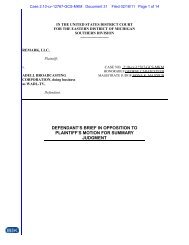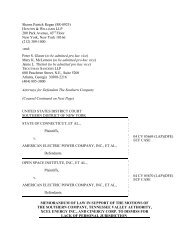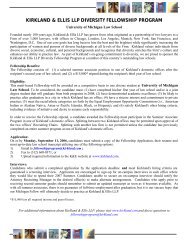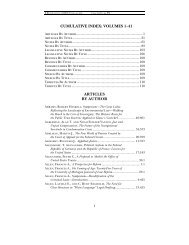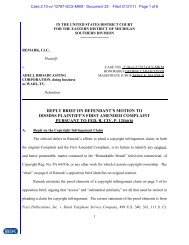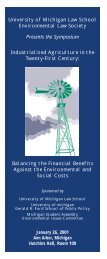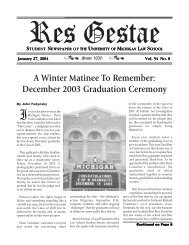Conn. v. American Electric, Memo in Support of Motion to Dismiss ...
Conn. v. American Electric, Memo in Support of Motion to Dismiss ...
Conn. v. American Electric, Memo in Support of Motion to Dismiss ...
Create successful ePaper yourself
Turn your PDF publications into a flip-book with our unique Google optimized e-Paper software.
§§ 831-831ee (2000 & Supp. II 2002), with authority under 16 U.S.C. § 831c(b) <strong>to</strong> sue and be<br />
sued <strong>in</strong> its own name. Under the TVA Act, TVA is charged with the multipurpose development<br />
<strong>of</strong> the resources <strong>of</strong> the Tennessee Valley region for the public good, 3 and has been granted broad<br />
statu<strong>to</strong>ry powers <strong>to</strong> carry out its mission. 4 TVA’s activities, <strong>in</strong>clud<strong>in</strong>g its electric power program<br />
activities, are widely known and judicially noticeable, 5 and, as a matter <strong>of</strong> Federal law, TVA’s<br />
authorized activities under the TVA Act are wholly governmental <strong>in</strong> nature. 6<br />
3 The purposes <strong>of</strong> the TVA Act are broad and <strong>in</strong>clude not only the production, distribution,<br />
and sale <strong>of</strong> electric power at rates as low as are feasible (16 U.S.C. §§ 831d(l), 831n-4(f)), but<br />
also “the advancement <strong>of</strong> the national defense and the physical, social and economic<br />
development” <strong>of</strong> the Tennessee Valley (id. § 831n-4(h)), “agricultural and <strong>in</strong>dustrial<br />
development” (id. § 831), improvement <strong>of</strong> navigation (id.), control <strong>of</strong> flood waters (id.), law<br />
enforcement (id. § 831c-3), and economic development (id. § 831u). Further, the TVA Act is <strong>to</strong><br />
be “liberally construed <strong>to</strong> carry out the purposes <strong>of</strong> Congress <strong>to</strong> . . . provide for the national<br />
defense, improve navigation, control destructive floods, and promote <strong>in</strong>terstate commerce and<br />
the general welfare.” Id. § 831dd.<br />
4 For example, TVA is authorized <strong>to</strong> condemn property <strong>in</strong> the name <strong>of</strong> the United States <strong>to</strong><br />
carry out the purposes <strong>of</strong> the TVA Act. See 16 U.S.C. §§ 831c(h) (TVA “[s]hall have power <strong>in</strong><br />
the name <strong>of</strong> the United States <strong>of</strong> America <strong>to</strong> exercise the right <strong>of</strong> em<strong>in</strong>ent doma<strong>in</strong> . . . .”). See<br />
also 16 U.S.C. § 831c(g) (2000) (TVA “[s]hall have such powers as may be necessary or<br />
appropriate for the exercise <strong>of</strong> the powers here<strong>in</strong> specifically conferred upon [TVA].”).<br />
5 See United States ex rel. TVA v. An Easement & Right-<strong>of</strong>-Way, Etc., 246 F. Supp. 263,<br />
269 (W.D. Ky. 1965) (“The basic facts as <strong>to</strong> the activities <strong>of</strong> TVA, <strong>in</strong>clud<strong>in</strong>g the development <strong>of</strong><br />
its power program and other statu<strong>to</strong>ry programs, are matters <strong>of</strong> public record and common<br />
knowledge; they are conta<strong>in</strong>ed <strong>in</strong> TVA’s annual reports <strong>to</strong> Congress and are judicially known <strong>to</strong><br />
the Court.”), aff’d, 375 F.2d 120 (6th Cir. 1967).<br />
6 Contrary <strong>to</strong> the rule <strong>of</strong>ten applied under state law <strong>to</strong> state and local government agencies,<br />
the authorized activities <strong>of</strong> Federal <strong>in</strong>strumentalities through which the Federal government acts<br />
are wholly governmental and cannot be parsed <strong>in</strong><strong>to</strong> governmental and non-governmental<br />
categories. See Fed. Land Bank v. Bd. <strong>of</strong> County Comm’rs, 368 U.S. 146, 150-51 (1961) (“[O]ur<br />
decisions have made it clear that the Federal Government performs no ‘proprietary’ functions. If<br />
the enabl<strong>in</strong>g Act is constitutional and if the <strong>in</strong>strumentality’s activity is with<strong>in</strong> the authority<br />
granted by the Act, a governmental function is be<strong>in</strong>g performed.”); Fed. Crop Ins. Corp. v.<br />
Merrill, 332 U.S. 380, 383-84 (1947) (“Government is not partly public or partly private,<br />
depend<strong>in</strong>g upon the governmental pedigree <strong>of</strong> the type <strong>of</strong> a particular activity or the manner <strong>in</strong><br />
which the Government conducts it.”); Fed. Land Bank v. Bismarck Lumber Co., 314 U.S. 95,<br />
4



